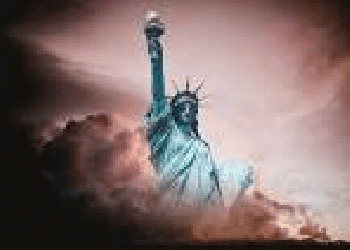
From maxpixel.net: Free photo Clouds Turmoil Political Statue Of Liberty - Max Pixel960 Ã-- 685 - 120k -
(Image by maxpixel.net) Details DMCA
Nations of the world are divided mainly according to their economic status into three groups: (1) prosperous, industrially developed, politically influencial; (2) industrially-developing countries in a transitional state from poverty to wealth and influence; and (3) poor, undeveloped countries living essentially in an unchanged past.
The prosperous, developed countries endeavor to maintain their status of wealth and influence in world affairs by constant competition with each other, tempered by ventures of cooperation. With the USA as an example, its activities mostly replicate the accomplishments of the past. Its national character, expressed usually as patriotism, is one of self-satisfaction and pride, albeit this is partly based on an illusion created by the distortions of history and popular media. By no means do all of its citizens share this image or participate in its accomplishments. It, too, is divided into classes, each with its own purposes. The upper class strives to maintain its position of wealth and influence.The middle professional and working classes strive to maintain their economic security and comfortable standard of living, and those in the lower working and poverty classes struggle for their basic needs.
Nations of the second, developing class, awakening to the modern world from a long slumber of empires, monarchies, tyrannies, oligarchies and colonization, have much to catch up on in the pursuit of modernity. They may be more united in their purpose of self-improvement, as we have witnessed in the transformations of the Soviet Union and China -- their people willing or required to sacrifice individual goals for the common good. Both countries instituted a national plan with specific five-year goals. China in particular has made astounding material progress in less than a half-century as a result of national planning, becoming the second-largest economy in the world and predicted to become the largest in the near future. Nevertheless, it may still be considered a developing country since the rewards of this progress are not yet shared by a large majority of its 1.4-billion population, and it is still encumbered by traditions of low wages, corruption and coercion typical of backward countries. The goal of the Chinese Republic is to become a fully developed modern society by it 100th-year anniversary in 2049.
While the developing nation must give the highest priority to economic factors of survival and growth, the developed nation can, presumably, graduate to a higher order of social concerns towards improving society beyond the restrictions and demands of a developing economy. More economic development does not necessarily mean progress. The USA today suffers greatly from over-development. It has capacity to produce things that do not necessarily contribute to a good standard of living throughout the nation, as would be characteristic of a model developed nation. Much material and human resources are expended for the military and luxury markets and the superfluous abundance that affects nearly everyone, at the expense of social developments in education, sciences, cultural and leisure activities, and public services benefitting everyone.
The question arises: Can developed nations rest on their laurels or should they also have a National Plan for progress? Although a nation may qualify as developed, new challenges are always arising. If it does not tackle them, it will regress towards the status of a developing nation. The biggest challenges today are the deteriorating environment and altering climate upon which all human activity depends, and a growing disparity of wealth and services throughout the country. The corruptions typical of developing countries may still exist in developed countries, disguised as normal yet insidious schemes that become part of standard business practices.
In the recent past, the USA did have something resembling a national plan. During the "Great" Depression of the 1930s, the Roosevelt administration launched the New Deal consisting of a series of programs with specific goals addressing unemployment, poverty, wages, dire farm problems, banking malpractice, social security, rural electrification and others. President Kennedy initiated a ten-year program to land an astronaut on the moon. President Lyndon Johnson initiated the Great Society, a plan to establish a War on Poverty and address issues of civil rights, racial discrimination, education, health, voting rights, rural poverty, economic opportunities, slum clearance, etc. Many of these goals came to pass in their times. They adhered to the principles stated in the Preamble of our constitution to promote the general welfare.
There is nothing today in the political climate of the USA resembling a national plan to solve the major problems we now face -- only a surreptitious plan to undo the gains of the past. Our policy is only to pursue "America's interest", but not the interest of all Americans or other peoples of the world. At this rate, the country will inevitably slide towards the status of a developing or backward country, if it has not already done so.
Under the duress of the problems we face today, we urgently need a master plan for national goals in accordance with our best democratic principles, as proclaimed in the Preamble of our constitution, by which we are committed to accomplish these goals within a critical scheduled time frame. Every measure approved by congress as part of the plan would state its purpose and include a termination clause; so if it did not reasonably fulfill its goal within the scheduled time, it would be replaced by a more effective one, regardless of the inconvenience. Only by such means will we progress towards the goal of a becoming a sustainable model democracy in a changing world.





